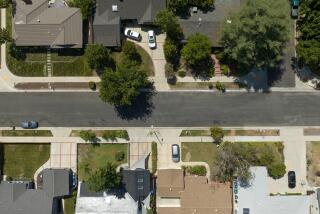Polishing Off the : Carwashes: Fixed-site operators are looking to the federal Water Quality Act for help in their struggles with mobile auto detailers.
- Share via
As if the recession weren’t cutting deeply enough into their profits, carwash owners are hurting at the hands of a growing service: mobile car detailers.
The mobile detailers with cloths, buckets, wax and carpet cleaners arrive at the customer’s home or office and charge the same amount that the car owner would pay to have the vehicle done at an auto wash.
The Orange Coast Car Wash Assn., by some accounts, is working to put the mobile car detailers out of business. The trade group stumbled upon a useful weapon earlier this month when the Orange County Environmental Management Agency called in fixed-site carwash operators to discuss the water they dump into storm drains. The agency is working to enforce the 1987 federal Water Quality Act, which affects a huge number of municipalities and businesses from gas stations to landfills, from homes to strip shopping centers.
The Car Wash Assn. has begun sounding an alarm that Orange County is about to crack down on mobile carwash operators, and it has contacted several of them to try to persuade them to go straight--and stationary.
But a county official says that the “crackdown” is imaginary and that the weapon the carwash operators think they have discovered is a mere water pistol.
“Mobile detailing is not that high a priority from an environmental standpoint,” said Richard Boon, supervisor of the county’s storm water section. “The fixed-site detailers are trying to put the mobile detailers out of business, and one route they’ve found is the storm water act.”
Automobile detailing is to a carwash what a souffle is to a pan-fried egg. Detailers polish the paint and chrome, shampoo the carpet, condition the upholstery and hose off the engine. The cost is about $150 the first time, when the car is presumably at its dirtiest, and about $100 each time afterward if the vehicle is brought in regularly.
Steve Marchese, owner of Steve’s for Detailing in Costa Mesa, is one of the bigger names in auto detailing: In the mid-1980s, he sold about 200 franchises across the country. But as people became familiar with the concept, they began opening their own detailing shops. In the past five years, mobile detailing has emerged as a special service offered to busy and well-to-do Southern Californians.
Marchese, who is the leader of the Orange Coast Car Wash Assn., said he is not trying to put mobile detailers out of business.
“I want to see the profession brought up to a professional level,” he said, noting that some mobile detailers have no offices, licenses or insurance, and do not pay taxes.
He admits, however, that his own company is not as busy as he would like. In his new building on Superior Avenue, Marchese could be detailing 40 cars a day and washing an additional 200. Lately, he said, he is doing about 20 detailing jobs daily and from 80 to 130 washes.
One of Orange County’s largest mobile detailers, Dave Hicok of Unique Auto Images in Santa Ana, points out that mobile detailers who operate without licenses and insurance have an unfair competitive advantage. He is a Marchese supporter.
“Steve’s goal is to elevate the level of business taking place among auto detailers,” said Hicok, whose business sends six trucks to Orange County homes.
But another mobile detailer, Brian Williams in Costa Mesa, said he doesn’t like the way Marchese has gone about fighting the battle.
“Steve said they’ve passed a law saying there’s no more mobile detailing,” said Williams, whose car clients have included the late Lucille Ball and Zeppo Marx. “But I found out there is no law; Steve’s making it up.”
In fact, there is a law.
It is the federal Water Quality Act, which was passed in 1987--a full five years ago. The exact regulations were not released to municipalities until November, 1990, the county’s Boon said, and since then, the requirement is that nothing--biodegradable or not--be released into storm drains except water.
Deciding how and when to enforce that law has occupied the county’s various environmental agencies under the leadership of the Orange County Environmental Management Agency. An additional two years may go by before agencies are equipped to detect an illegal emission and trace it, Boon said. Until then, officials are relying on public awareness to keep storm drains free of soap, grease and other contaminants.
The Environmental Management Agency last year sent notices to all construction-related businesses and, this year, has contacted manufacturers.
Boon, along with other agency employees, speaks to industry associations about the law. For the past 18 months, he said, the agency has taken 20 to 30 calls a day about it.
Still, until last week, the county had not given a thought to auto detailers, Boon said. That was when Marchese began putting out word that a crackdown was imminent.
The Environmental Management Agency recommends that mobile detailers lay mats underneath cars while they work. A mat with plastic-foam sides is made especially for such jobs; it catches the water, which is then sucked up with a special vacuum and deposited in a tank. From there, it can be recycled.
Scott Thompson, a former mobile detailer who plans to open a stationary carwash center in Laguna Beach, said the mat-and-vacuum system is a workable solution and answers his environmental concerns.
“People say that mobile detailing pollutes a small amount compared to other things,” he said. “But you can’t look at it that way. Everyone has got to do their share.”
More to Read
Inside the business of entertainment
The Wide Shot brings you news, analysis and insights on everything from streaming wars to production — and what it all means for the future.
You may occasionally receive promotional content from the Los Angeles Times.










